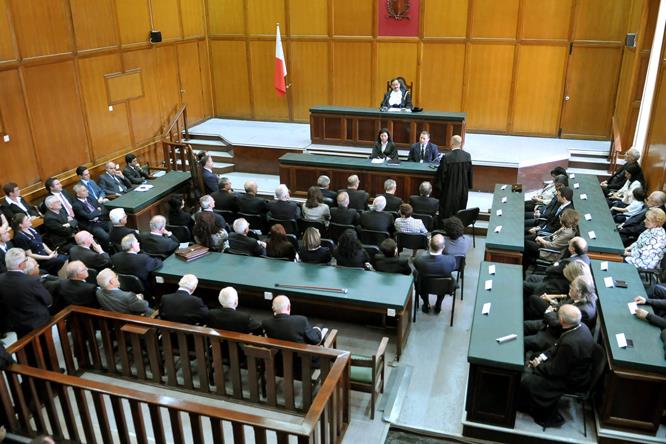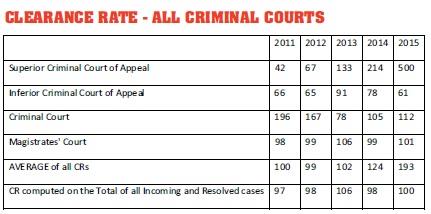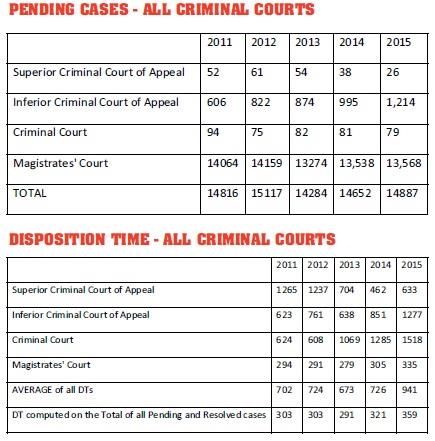A series of PQs addressed to Justice Minister Owen Bonnici have shown how the justice reform is in full swing, with recently introduced measures already bearing fruit and more interesting developments in the pipeline and expected in the coming weeks and months.
Among the most interesting measures is the widening of a pilot project where lawyers act as prosecutors instead of police inspectors. The inspectors who prosecute individuals in court are usually the same ones who would have investigated the case at hand. It has long been said that police inspectors waste many hours a week in court when their time could be better spent investigating and doing actual police work.
Dr Bonnici also said that the right to a lawyer during arrest will also be strengthened during 2016, while there will be improvements (through the utilisation of EU funds) of the training given to judges, magistrates and court employees.

Human resources
Human resources at the courts will be strengthened. Each judge in the civil courts has now been assigned a Court Attorney. These attorneys help with the drafting of sentences and carry out the relevant research, effectively speeding up the process. Dr Bonnici said that while it was still early to speak about results, since the Court Attorneys have only been employed for a couple of months at the most, they have already drafted some 240 sentences. Some of the sentences had been pending for a long time. There are currently 13 Court Attorneys.
The Minister said the court website will also be improved. Its intranet will start serving as a platform for the eFees project. This will provide court employees the facility to access precise fee bills owed for every civil case. The bills will be automatically updated. This will expedite procedures since the process up till now is carried out manually. The public will also be better served since people will be able to check their fees online and also affect online payments. Judicial acts will also be available online and in this case there will also be the online payment facility.

Legal Aid
Legal Aid services for people who cannot afford a lawyer will also be widened. Dr Bonnici said the Legal Aid Agency was set up by a Legal Notice in November 2014. The agency functions independently from the Attorney General’s Office. This means that all legal aid services in the criminal and civil fields is impartial and autonomous from the prosecution and the AG’s office, which represents government entities and departments.
In September 2015 the agency got a manager whose functions include managing administrative operations, the appointment of legal aid lawyers, ensuring the timely remuneration for lawyers and legal procurators and hearing complaints. The agency will this year employ a person to carry out clerical tasks.
Alternative Dispute Resolutions
The government is also promoting Alternative Dispute Resolutions. These can be split into two: mediation and arbitration. As announced in the budget the government will work to increase ADR in both scenarios – this should lead to more expedited procedures that make economic sense and reduce the need for people to seek redress by the courts. Voluntary mediation is practically non-existent in Malta, Dr Bonnici said. The government intends to consult with stakeholders and foreign expert so that ADR becomes the norm.
Dr Bonnici said cases of voluntary arbitration in domestic cases had increased by 18% while international arbitration cases increased by 50%. However this was still not enough and the government wants to strengthen the Arbitration Centre. A call has been issued to find a strategic partner to convert the Arbitration Centre into a more efficient and effective hub for the resolution of disputes, both locally and internationally.

Appeals
Dr Bonnici said the appeals system is somewhat different than the other courts. The number of new appeals depends on the number of cases closed in the other courts and the people who decide to contest their sentence. There is a danger that the increase in the number of concluded cases in the first courts will lead to a backlog in the appeals courts. The government is resorting to a number if initiatives aimed at expediting the appeals process. This should avoid having people filing frivolous appeals just to buy time.
Clearance rate and disposition time
The number of pending cases before the civil courts decreased by 11% in 2015 when compared to 2012. There were 10,274 pending cases in 2015. In 2012 there were 11,533 civil cases.

Disposition Time
Disposition Time is the average time taken to conclude a case. This has decreased from 777 days in 2012 to 668 days in 2015.

Clearance Rate
The Clearance Rate is the rate at which cases are concluded compared to the number of new cases filed. This increased from 99% in 2012 to 112% in 2015. This means that the courts are now concluding more cases in a year than the total of new cases filed.
Criminal Courts
The Magistrate’s Court hears 95% of all criminal cases. For the second year in a row this court has cleared more cases than it has received new ones. Last year it had a clearance rate of 101%.
This court had 14,887 pending cases in 2015, compared to 15,117 in 2012.

Disposition Time – All Criminal Courts
The disposition time at the Criminal Courts increased partially from 303 days in 2012 to 359 days in 2015. More work needs to be done here, Dr Bonnici said.
Dr Bonnici added that considerable improvement had been registered at the Court of Appeals (Superior), where the clearance rate increased from 67% in 2012 to 500% in 2015. The Inferior Court of Appeals had a less satisfactory result due to the fact that it lost two Magistrates towards the end of the year.